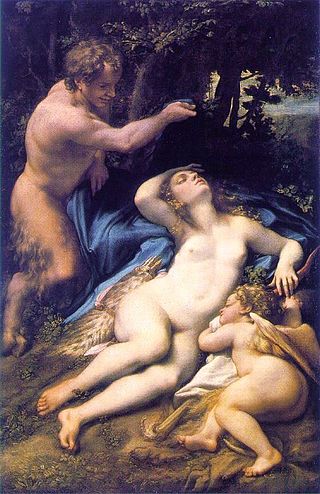Related Research Articles
In Greek mythology, Aegyptus or Ægyptus was a legendary king of ancient Egypt. He was a descendant of the princess Io through his father Belus, and of the river-god Nilus as both the father of Achiroe, his mother and as a great, great-grandfather on his father's side.
Aganippe was a name or epithet of several figures in Greek mythology:

In Greek mythology, Agave, the daughter of Cadmus, was a princess of Thebes and the queen of the Maenads, followers of Dionysus.
In Greek mythology, Asia was one of the 3,000 Oceanids, daughters of the Titans Oceanus and his sister-spouse Tethys. In some accounts, her mother was called Pompholyge and sister of Libye.
Admete or Admeta, was in Greek mythology, a Mycenaean princess. She was the daughter of King Eurystheus and Antimache and sister to Alexander, Iphimedon, Eurybius, Mentor, Perimedes and possibly, Eurypylus. The name of Admete/ Admeta was the female form of Admetus.
In Greek mythology, Belus was a king of Egypt and father of Aegyptus and Danaus and (usually) brother to Agenor. The wife of Belus has been named as Achiroe or Side.
In Greek mythology, Aethusa was a daughter of Poseidon and the Pleiad Alcyone, daughter of Atlas. She was loved by Apollo and bore to him Eleuther and Linus. Through either of the latter two, Aethusa became the grandmother of Pierus, father of Oeagrus, father of the musician Orpheus. Because of this genealogical fact, she was usually identified as a Thracian.
Aegiale or Aegialeia or Aegialia was, in Greek mythology, a daughter of Adrastus and Amphithea, or of Aegialeus the son of Adrastus, whence she bears the surname of Adrastine. One account refers to her as Euryaleia.
In Greek mythology, Aegiale was the mother of Alcyone by Aeolus, according to the mythographer Hyginus. In other accounts, it is instead Enarete who is the mother of Alcyone by Aeolus.
Acraea was a name that had several uses in Greek and Roman mythology.
In Greek mythology, Aerope was a daughter of Cepheus of Arcadia, who was king of Tegea. She had a son (Aeropus?) by Ares, but herself died in labor. The child survived by sucking its dead mother's breasts, which Ares had caused to still produce an abundance of milk. Because of this, Ares was called Aphneius ("Abundant"), and was honored under that name with a sanctuary on Mount Cresius. Pausanias goes on to report that the hill was said to have been given the name Aeropus.

In Greek mythology, Phineus was a son of Belus by Anchinoe and thus brother to Aegyptus, Danaus and Cepheus.
In Greek mythology, Anchiroe or Ankhiroê, also called Anchinoe or Archinoe, was the consort of Sithon, son of Ares, and the mother of two daughters, Pallene and Rhoetea, from whom two towns derived their names. In some accounts, Achiroe was the mother of Sithon, Pallene and Rhoeteia by Ares instead.
In Greek mythology, Asterope may refer to the following characters:

In Greek mythology, Actaeä or Aktaia may refer to the following figures:
In Greek mythology, Admete is a name attributed two different figures:

In Greek mythology, Antiope or Antiopa may refer to the following
In Greek mythology, Agave may refer to the following characters:
In Greek mythology, Aeolia daughter of Amythaon and wife of Calydon, eponym of the city in Aetolia. She had two daughters namely Epicaste, wife of Agenor and Protogeneia, mother of Oxylus by Ares.
In Greek mythology, Aglaope, also called Aglaopheme (Ἀγλαοφήμη) and Aglaophonos (Ἀγλαόφωνος), is the name of one of the Sirens. Her name means "with lambent voice". Aglaope was attested as a daughter of the river-god Achelous and the Muse Melpomene or her sister Terpsichore or Sterope, daughter of King Porthaon of Calydon. She may have two or one sister(s), namely Peisinoe or Molpe, or just Thelxiepeia or Thelxinoe.
References
- Apollodorus, The Library with an English Translation by Sir James George Frazer, F.B.A., F.R.S. in 2 Volumes, Cambridge, MA, Harvard University Press; London, William Heinemann Ltd. 1921. ISBN 0-674-99135-4. Online version at the Perseus Digital Library. Greek text available from the same website.
- Bell, Robert E., Women of Classical Mythology: A Biographical Dictionary. ABC-Clio. 1991. ISBN 9780874365818 , 0874365813.
![]() This article incorporates text from a publication now in the public domain : Smith, William, ed. (1870). "Achiroe". Dictionary of Greek and Roman Biography and Mythology .
This article incorporates text from a publication now in the public domain : Smith, William, ed. (1870). "Achiroe". Dictionary of Greek and Roman Biography and Mythology .